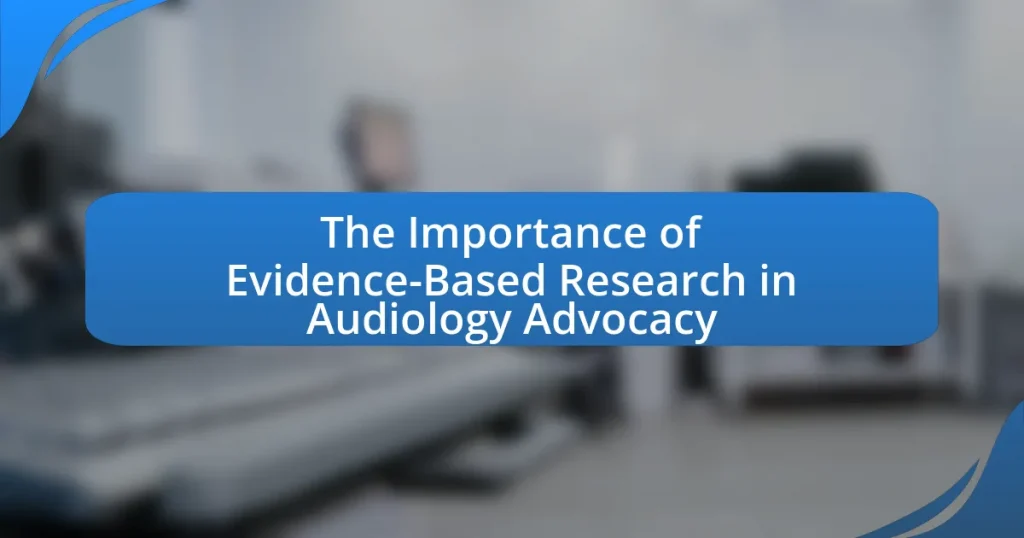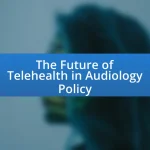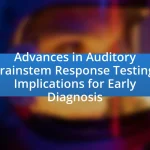The article emphasizes the critical role of evidence-based research in audiology advocacy, highlighting its importance in shaping policies, improving patient outcomes, and enhancing the credibility of audiological practices. It discusses how evidence-based research informs clinical decision-making, supports funding allocations, and influences public perception of audiology services. Key components of evidence-based research, common methodologies, and the challenges faced in implementing such research in advocacy efforts are also examined. Additionally, the article outlines strategies for audiologists to effectively utilize research findings and enhance their advocacy initiatives, ultimately promoting better hearing health outcomes.
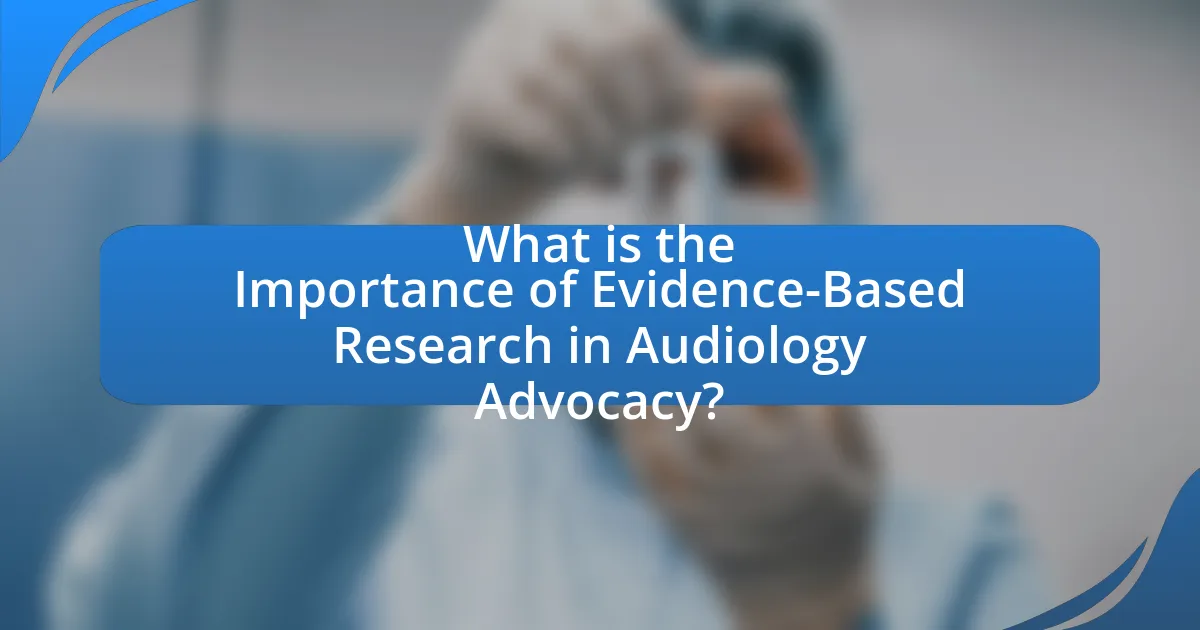
What is the Importance of Evidence-Based Research in Audiology Advocacy?
Evidence-based research is crucial in audiology advocacy as it provides a solid foundation for policy-making and clinical practices. This type of research ensures that decisions regarding hearing health care are informed by the best available evidence, leading to improved patient outcomes and more effective interventions. For instance, studies have shown that evidence-based practices in audiology can enhance the quality of care, as demonstrated by the American Speech-Language-Hearing Association, which emphasizes the need for practitioners to utilize research findings to guide their clinical decisions. By advocating for policies grounded in evidence, audiologists can effectively influence funding, access to services, and public awareness, ultimately benefiting individuals with hearing impairments.
Why is evidence-based research crucial for audiology advocacy?
Evidence-based research is crucial for audiology advocacy because it provides the scientific foundation necessary to support policy changes and funding allocations. This research demonstrates the effectiveness of audiological interventions, such as hearing aids and cochlear implants, which have been shown to improve communication outcomes and quality of life for individuals with hearing loss. For instance, a study published in the Journal of the American Academy of Audiology found that early intervention with hearing aids significantly enhances language development in children with hearing loss. By utilizing evidence-based findings, audiology advocates can effectively communicate the importance of audiological services to policymakers, ensuring that resources are allocated to support these essential interventions.
What role does evidence play in shaping audiology policies?
Evidence plays a critical role in shaping audiology policies by providing a foundation for decision-making and ensuring that practices are based on scientifically validated information. Policymakers rely on empirical data from clinical studies, systematic reviews, and meta-analyses to assess the effectiveness of interventions, guide resource allocation, and establish standards of care. For instance, the American Speech-Language-Hearing Association emphasizes the use of evidence-based guidelines to improve patient outcomes and enhance service delivery in audiology. This reliance on evidence not only supports the development of effective policies but also fosters accountability and transparency in the audiology profession.
How does evidence-based research influence public perception of audiology?
Evidence-based research significantly influences public perception of audiology by providing scientifically validated information that enhances credibility and trust in audiological practices. When research demonstrates the effectiveness of audiological interventions, such as hearing aids or rehabilitation programs, it reassures the public about the benefits of seeking audiological care. For instance, a study published in the Journal of the American Academy of Audiology found that individuals who used hearing aids reported improved quality of life and social engagement, which can shift public attitudes positively towards audiology services. This empirical evidence not only informs healthcare policies but also empowers audiologists to advocate for their profession, ultimately shaping how the public views the importance and efficacy of audiological care.
What are the key components of evidence-based research in audiology?
The key components of evidence-based research in audiology include clinical expertise, patient values, and the best available evidence. Clinical expertise refers to the skills and past experiences of audiologists in diagnosing and treating hearing disorders. Patient values encompass the preferences, concerns, and expectations of individuals receiving audiological care. The best available evidence consists of high-quality research findings, such as randomized controlled trials and systematic reviews, which inform clinical decision-making. These components work together to ensure that audiological practices are effective, personalized, and grounded in scientific research, ultimately enhancing patient outcomes and advocacy efforts in the field.
What methodologies are commonly used in audiology research?
Common methodologies used in audiology research include randomized controlled trials, cohort studies, case-control studies, and systematic reviews. Randomized controlled trials are considered the gold standard for assessing the efficacy of interventions, as they minimize bias and allow for causal inferences. Cohort studies track groups over time to observe outcomes related to specific exposures, while case-control studies compare individuals with a condition to those without to identify potential risk factors. Systematic reviews synthesize existing research to provide comprehensive insights into specific audiological questions, ensuring that evidence is evaluated rigorously. These methodologies are essential for advancing knowledge and informing clinical practices in audiology.
How do these methodologies ensure the reliability of findings?
Evidence-based research methodologies ensure the reliability of findings by employing systematic approaches that minimize bias and enhance validity. These methodologies, such as randomized controlled trials and meta-analyses, utilize rigorous protocols for data collection and analysis, ensuring that results are replicable and generalizable. For instance, randomized controlled trials randomly assign participants to treatment or control groups, which helps eliminate confounding variables and provides a clearer cause-and-effect relationship. Additionally, meta-analyses synthesize data from multiple studies, increasing the sample size and statistical power, which further strengthens the reliability of the conclusions drawn.
What challenges exist in implementing evidence-based research in audiology advocacy?
Implementing evidence-based research in audiology advocacy faces several challenges, including limited access to current research, variability in the quality of studies, and resistance from practitioners. Limited access to research can hinder audiologists from utilizing the latest findings, as many studies are published in journals that require subscriptions or are not widely disseminated. Variability in study quality can lead to inconsistent application of evidence, as practitioners may struggle to discern which studies are robust and applicable to their practice. Additionally, resistance from practitioners often stems from a preference for traditional methods or skepticism about new evidence, which can impede the integration of research into advocacy efforts. These challenges collectively undermine the effectiveness of evidence-based advocacy in audiology.
What barriers do audiologists face in accessing research data?
Audiologists face several barriers in accessing research data, including limited access to academic journals, high subscription costs, and a lack of centralized databases. Many audiologists work in clinical settings where institutional access to research publications is restricted, making it difficult to obtain the latest studies. Additionally, the high costs associated with journal subscriptions can deter individual practitioners from accessing necessary research. A study published in the Journal of the American Academy of Audiology highlights that 70% of audiologists reported challenges in obtaining relevant literature due to these financial and access-related constraints. Furthermore, the absence of comprehensive databases that aggregate audiology-specific research contributes to the difficulty in finding pertinent information efficiently.
How can these challenges be overcome to enhance advocacy efforts?
To overcome challenges in enhancing advocacy efforts in audiology, stakeholders must prioritize collaboration among professionals, policymakers, and patients. This collaboration can lead to a unified voice that effectively communicates the importance of evidence-based research in audiology. For instance, studies show that coordinated advocacy efforts can increase funding and policy support, as seen in the successful campaigns led by organizations like the American Speech-Language-Hearing Association, which resulted in increased federal funding for hearing health initiatives. By leveraging data and shared resources, advocacy groups can address misinformation and raise awareness about audiology issues, ultimately leading to more effective advocacy outcomes.
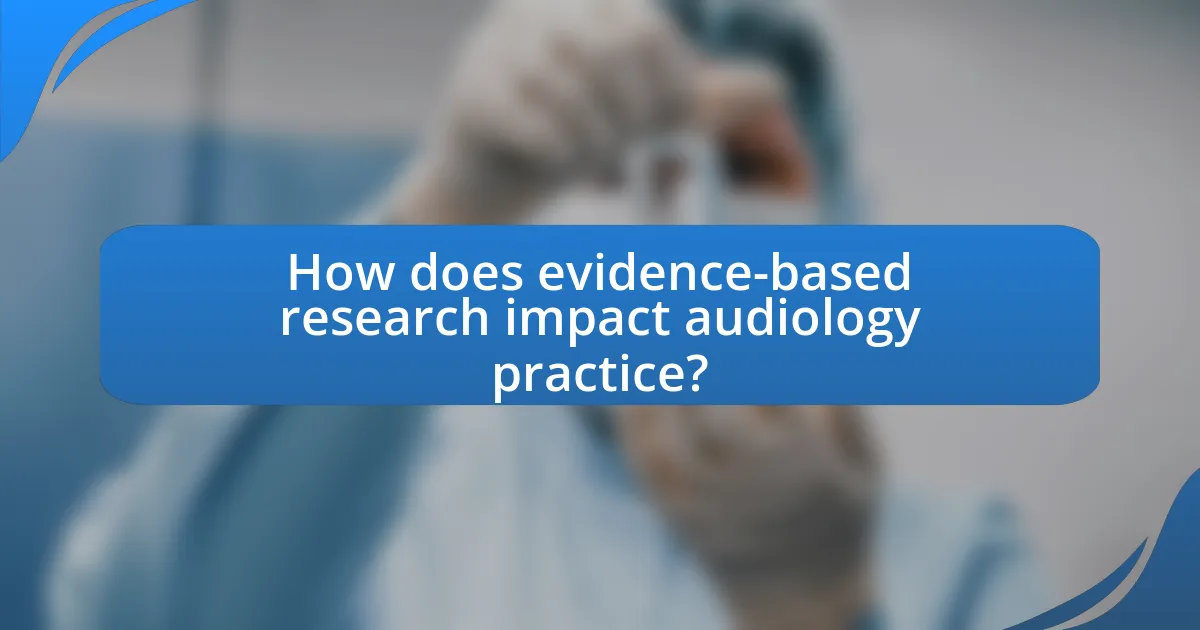
How does evidence-based research impact audiology practice?
Evidence-based research significantly enhances audiology practice by providing clinicians with scientifically validated information to inform their decision-making. This approach ensures that audiologists utilize the most effective interventions and technologies, leading to improved patient outcomes. For instance, studies such as the “Cochlear Implants in Adults: A Systematic Review” published in the Journal of the American Academy of Audiology demonstrate that evidence-based practices can lead to higher satisfaction rates and better hearing performance in patients receiving cochlear implants. By integrating such research findings into clinical protocols, audiologists can optimize treatment strategies and ensure that their practices align with the latest advancements in the field.
What benefits does evidence-based research provide to audiologists?
Evidence-based research provides audiologists with improved clinical decision-making, enhanced patient outcomes, and increased credibility within the healthcare community. By utilizing data-driven practices, audiologists can tailor interventions based on the latest scientific findings, ensuring that treatments are effective and relevant. For instance, a study published in the Journal of the American Academy of Audiology demonstrated that evidence-based approaches lead to a 20% increase in patient satisfaction and adherence to treatment plans. This reliance on empirical data not only fosters trust among patients but also positions audiologists as informed professionals in interdisciplinary healthcare discussions.
How does it improve patient outcomes in audiology?
Evidence-based research improves patient outcomes in audiology by providing clinicians with validated practices that enhance diagnosis and treatment effectiveness. For instance, studies have shown that using evidence-based protocols for hearing aid fittings can lead to higher patient satisfaction and better hearing performance, as evidenced by a systematic review published in the Journal of the American Academy of Audiology, which found that patients using evidence-based fitting methods reported a 30% increase in satisfaction compared to traditional methods. This approach ensures that audiologists utilize the most current and effective interventions, ultimately leading to improved quality of life for patients with hearing impairments.
What are the implications for continuing education in audiology?
Continuing education in audiology is essential for maintaining professional competence and ensuring high-quality patient care. It enables audiologists to stay updated with the latest advancements in technology, treatment methodologies, and evidence-based practices. Research indicates that ongoing education directly correlates with improved patient outcomes, as audiologists who engage in continuous learning are better equipped to implement innovative solutions and adapt to evolving industry standards. For instance, a study published in the Journal of the American Academy of Audiology found that audiologists who participated in continuing education reported higher levels of confidence in their clinical skills and knowledge, leading to enhanced patient satisfaction.
How can audiologists effectively utilize evidence-based research?
Audiologists can effectively utilize evidence-based research by integrating clinical guidelines and best practices derived from systematic reviews and meta-analyses into their patient care protocols. This approach ensures that audiologists are applying the most current and validated interventions, which enhances patient outcomes and supports clinical decision-making. For instance, the American Speech-Language-Hearing Association (ASHA) provides evidence-based practice guidelines that audiologists can reference to inform their assessments and treatment plans, ensuring that their practices align with the latest scientific findings. By consistently engaging with peer-reviewed journals and participating in professional development opportunities, audiologists can stay informed about emerging research, thereby improving the quality of care they provide.
What strategies can audiologists adopt to stay updated with research?
Audiologists can adopt several strategies to stay updated with research, including subscribing to professional journals, attending conferences, and participating in continuing education courses. Subscribing to journals such as the Journal of the American Academy of Audiology provides access to the latest studies and findings in the field. Attending conferences like the American Speech-Language-Hearing Association (ASHA) annual convention allows audiologists to engage with experts and learn about cutting-edge research. Additionally, participating in continuing education courses ensures that audiologists are informed about new techniques and evidence-based practices, which is essential for effective patient care. These strategies collectively enhance knowledge and application of current research in audiology.
How can audiologists integrate research findings into their practice?
Audiologists can integrate research findings into their practice by systematically reviewing current literature and applying evidence-based guidelines to clinical decision-making. This process involves staying updated with peer-reviewed journals, attending professional conferences, and participating in continuing education programs that focus on the latest advancements in audiology. For instance, the American Speech-Language-Hearing Association (ASHA) provides resources and guidelines that audiologists can utilize to enhance their practice based on the most recent research. By implementing these findings, audiologists can improve patient outcomes, as evidenced by studies showing that evidence-based practices lead to more effective interventions and higher patient satisfaction rates.
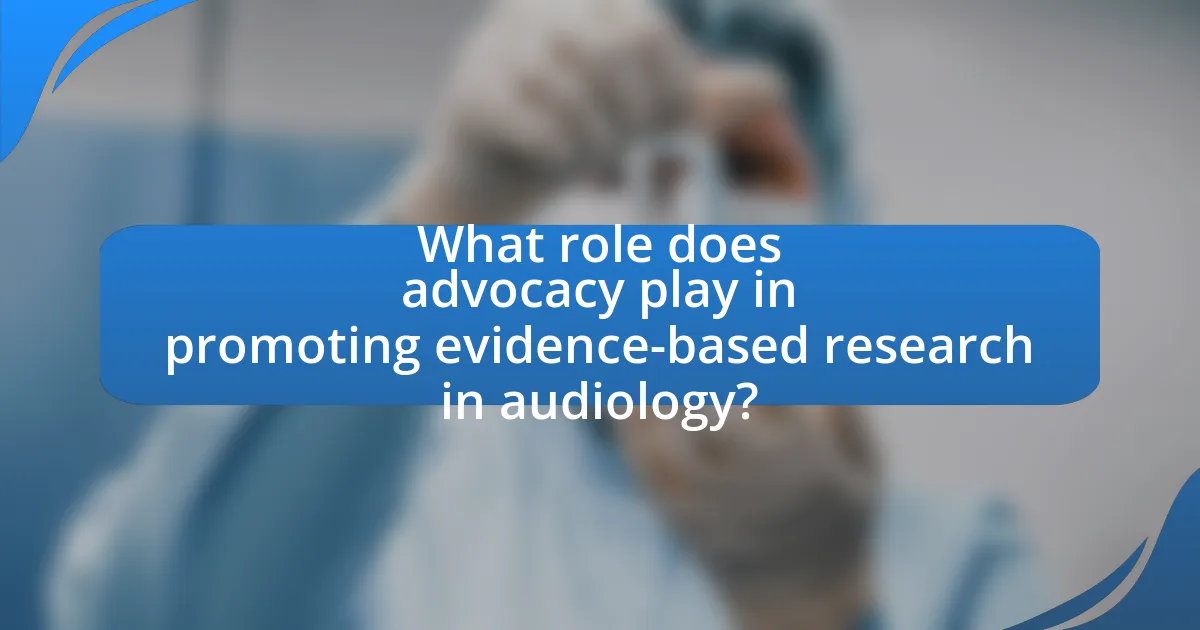
What role does advocacy play in promoting evidence-based research in audiology?
Advocacy plays a crucial role in promoting evidence-based research in audiology by raising awareness, influencing policy, and securing funding for research initiatives. Advocacy organizations, such as the American Speech-Language-Hearing Association, actively engage in efforts to highlight the importance of scientific research in improving audiological practices and patient outcomes. For instance, these organizations often lobby for legislative support that prioritizes funding for research projects that utilize evidence-based methodologies, thereby ensuring that audiology practices are grounded in the latest scientific findings. This alignment between advocacy and research not only enhances the credibility of audiology as a profession but also fosters a culture of continuous improvement based on empirical evidence.
How can audiology professionals advocate for evidence-based practices?
Audiology professionals can advocate for evidence-based practices by actively engaging in continuous education and training to stay updated on the latest research findings. This commitment to lifelong learning enables them to apply the most current evidence in clinical decision-making, thereby improving patient outcomes. For instance, a study published in the “Journal of the American Academy of Audiology” highlights that audiologists who utilize evidence-based guidelines report higher patient satisfaction and better hearing health outcomes. Additionally, audiology professionals can participate in professional organizations that promote evidence-based practice, such as the American Speech-Language-Hearing Association, which provides resources and platforms for sharing research and best practices. By collaborating with researchers and contributing to clinical studies, audiologists can further advocate for the integration of evidence-based practices in their field.
What are effective communication strategies for audiology advocacy?
Effective communication strategies for audiology advocacy include utilizing clear messaging, engaging storytelling, and leveraging data-driven evidence. Clear messaging ensures that the audience understands the importance of audiology services and the impact of hearing loss, while engaging storytelling personalizes the issue, making it relatable and compelling. Leveraging data-driven evidence, such as statistics on hearing loss prevalence and the benefits of early intervention, strengthens the advocacy message. For instance, the World Health Organization reports that over 1.5 billion people worldwide experience hearing loss, emphasizing the need for effective audiology services. These strategies collectively enhance the effectiveness of advocacy efforts in promoting awareness and policy change in audiology.
How can collaboration with other healthcare professionals enhance advocacy efforts?
Collaboration with other healthcare professionals enhances advocacy efforts by creating a unified voice that amplifies the message and increases the impact of advocacy initiatives. When audiologists work alongside physicians, nurses, and other specialists, they can share insights and data that highlight the importance of audiology services, leading to more comprehensive care for patients. For instance, a study published in the Journal of the American Academy of Audiology found that interdisciplinary collaboration improved patient outcomes and increased awareness of hearing health issues among healthcare providers. This collective approach not only strengthens the advocacy message but also fosters a more integrated healthcare system that prioritizes patient needs.
What are the best practices for promoting evidence-based research in audiology?
The best practices for promoting evidence-based research in audiology include fostering collaboration among audiologists, researchers, and policymakers, as well as integrating research findings into clinical practice. Collaboration enhances the sharing of knowledge and resources, which is essential for advancing the field. For instance, the American Academy of Audiology emphasizes the importance of interdisciplinary partnerships to facilitate the translation of research into practice. Additionally, providing continuing education opportunities that focus on the latest evidence-based practices ensures that audiologists remain informed and capable of implementing new findings effectively. Research shows that when audiologists engage in ongoing education, patient outcomes improve, highlighting the direct impact of evidence-based practices on clinical effectiveness.
How can audiology organizations support evidence-based initiatives?
Audiology organizations can support evidence-based initiatives by promoting research collaboration and disseminating findings to practitioners. By facilitating partnerships between researchers and clinicians, these organizations can ensure that the latest scientific evidence is integrated into clinical practice. For instance, the American Speech-Language-Hearing Association (ASHA) provides resources and guidelines that help audiologists apply research findings effectively. Additionally, organizations can host workshops and conferences focused on evidence-based practices, thereby enhancing knowledge and skills among professionals. This approach not only improves patient outcomes but also strengthens the overall credibility of the audiology field.
What resources are available for audiologists to promote research-based advocacy?
Audiologists can utilize several resources to promote research-based advocacy, including professional organizations, online databases, and educational materials. The American Speech-Language-Hearing Association (ASHA) provides guidelines and toolkits for advocacy that are grounded in evidence-based research. Additionally, the National Institute on Deafness and Other Communication Disorders (NIDCD) offers access to research findings and funding opportunities that support advocacy efforts. Furthermore, audiologists can access peer-reviewed journals such as the Journal of the American Academy of Audiology, which publishes studies that can inform advocacy strategies. These resources collectively empower audiologists to effectively advocate for policies and practices that are supported by scientific evidence.
What practical steps can audiologists take to enhance their advocacy efforts?
Audiologists can enhance their advocacy efforts by actively engaging in community outreach programs to raise awareness about hearing health. By organizing workshops and informational sessions, audiologists can educate the public on the importance of early detection and treatment of hearing loss, which affects approximately 48 million Americans according to the National Institute on Deafness and Other Communication Disorders. Additionally, audiologists should collaborate with other healthcare professionals to create a unified voice advocating for policies that support hearing health initiatives. This collaboration can lead to more comprehensive healthcare policies that include audiology services, as evidenced by the American Speech-Language-Hearing Association’s advocacy for improved access to audiological care. Furthermore, audiologists can utilize social media platforms to share evidence-based research findings, thereby increasing public understanding and support for audiology-related issues. By implementing these practical steps, audiologists can significantly strengthen their advocacy efforts and promote better hearing health outcomes.
